I’m a chef working on tour with major artists in the rock ‘n’ roll industry in Europe. Every day we get off a tour bus after an average of 6 hours sleep, unload the truck, build a kitchen inside a stadium, cook breakfast, lunch, dinner and after-show food for 200-odd crew and artists alike, break down and clean kitchen, push it back on the truck and drag our tired, adrenalized and ragged selves back to a coffin-sized bunk and sleep while the tour rolls into the next venue.
I’m sure you can see the potential of a no-holds-barred rock’n’roll food documentary. It’s insane, it’s brutal, its fun, it’s emotionally charged, it’s cooking with gas.
Any tips about working in tight fluorescent hallways inside stadiums and arenas? I’m taking a GoPro, with remote, a shotgun mike, tripod, lights and a reflector etc. spare batteries, sd cards, hard drives, and either a Canon xa10, xf100,xf105, or a Panasonic ac-90
Attached is a short produced by a good friend who will be helping me with the time-lapse aspects of my own footage.
–Chris
Wow! Sounds like a great subject! Your passion and energy really come through. The time-lapses (below) are beautiful.
But I’m worried—
In all that passionate description, you haven’t told me what your doc is about. Or more precisely, who your doc is about.
In film, equipment and lighting decisions come after story decisions. Why? Because nobody likes to spend time or money acquiring and lugging around equipment that’s wrong for the job. How do we know the right equipment? We develop as precise an idea as possible about the story first.
To know your story in a documentary, you have to know very specifically who the story is about. A doc about “a bunch of people” cooking on the road is unfocused. Shooting everyone is like shooting no one. You end up with an amorphous mess with no compelling characters. You have no story. Without story, your doc will feel like a time-lapse—pretty, full of motion, and ultimately meaningless without context. It may be beautiful, but it won’t draw us in.
The key to a great doc is specific characters with a strong need or want and a difficult journey. Who is the lead character in your story? What are they desperately trying to do, at which they very well may not succeed?
Do you need GoPros and timelapses? What’s the best way to light? Tell me the story first. Once we know who’s doing what, building an equipment list is easy.
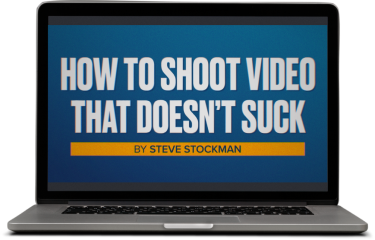
Get a free preview of the new video course!
Sample two lessons from our new video course free right now. No signup or credit card required!




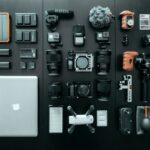

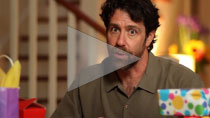
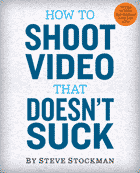


 Steve Stockman is a writer/ producer/ director in Los Angeles. How to Shoot Video That Doesn't Suck, available in 9 languages, is the best selling video how-to book in the world. You can find the updated edition from Workman Publishing wherever you get books, ebooks or audiobooks.
Steve Stockman is a writer/ producer/ director in Los Angeles. How to Shoot Video That Doesn't Suck, available in 9 languages, is the best selling video how-to book in the world. You can find the updated edition from Workman Publishing wherever you get books, ebooks or audiobooks. 
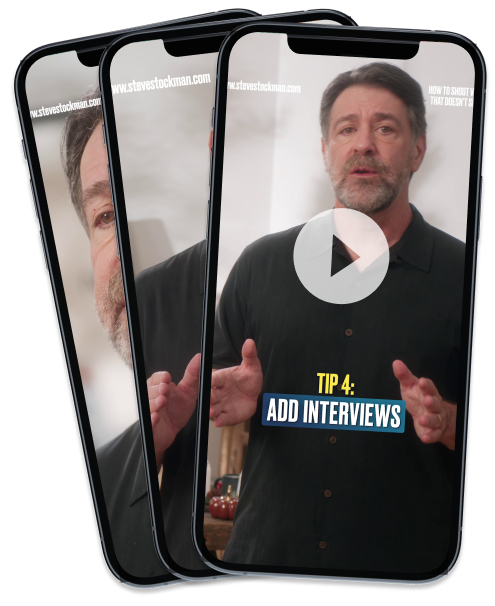
Steve,
Thanks for your great site. I've got the book and am building my skills a chapter at a time. The above post comes at an opportune time for me. I'm writing the story for a documentary of a river trip my wife and I are taking with friends. I have the pitch, script and a shot list, but after reading more about story, I realize mine is pretty weak. Tomorrow, I'll dig deeper to find the best hero with the most compelling need.
Turned my friend on to your book and site yesterday. He called today to thank me.
Thanks, Steve. Great to hear!
Steve – Great advice, as always. Story telling is one of the harder things to grasp for new film makers like myself. Shooting cool shots and playing with gear is fun, but like Sohail, I need to learn the craft of story telling. Your book and website tips are always helpful, and I refer to your book often. For me, I try to look for a story in everything I see, even the most mundane stuff of daily life.
Steve,
You make a lot of sense with respect to coming up with a story. But it ain't as easy it sounds — that's not to suggest that you're claiming it to be.
So a question: Do you have any tips on how to put together a story? More specifically, if we may, let's take the cooking angle here. Do you have any compelling storylines that could help bring some structure to a potential video?
A story needs a hero, a beginning, middle and end. In this rock-tour-chef scenario, you’re given a choice of heroes. Your goal as a filmmaker is to choose from among potential heroes the ones with the best stories– the strongest beginnings, middles, and ends. To do that, you’ll need to learn everything you can about the candidates.
Who are they? What are their goals in life? What are their goals on the tour? Brainstorm the things they’ll need to do in order to get what they want. Maybe one chef wants to use the tour to meet financiers to open his own restaurant, or one wants to be promoted from dishwasher to sous-chef, or one really wants to play backup in the band and sees this was her way in…. The stories could be anything, but they come from the characters, the heroes. You are the detective who finds the stories and as a writer/filmmaker, shapes them.
One general note: the bigger the hero’s goal– the greater the potential for failure– the better the story.